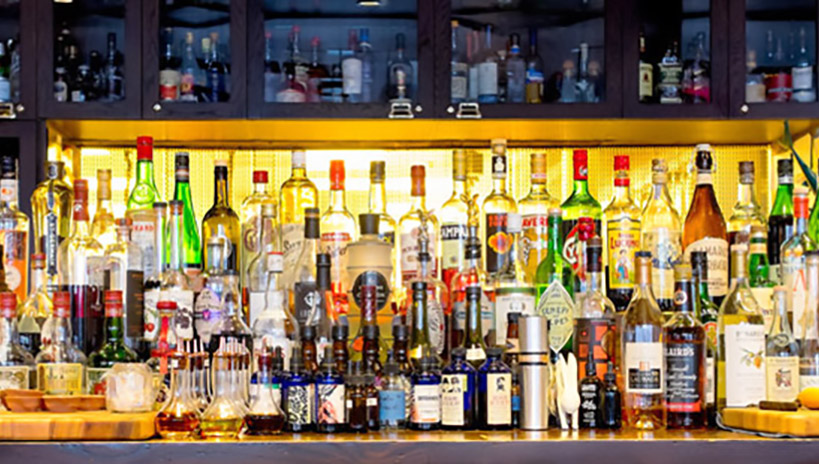vd
Publisher's note: This post appears here courtesy of the Carolina Journal, and written by John Trump.

I've written
volumes over the past few years about the way North Carolina controls distilled spirits.
There's little need to recount the many problems here, other than to say the coronavirus and the ensuing consumer panic has exposed the N.C. Alcoholic Beverage Control system for what is.
It's draconian and harsh. Arcane and unfriendly to small producers and consumers.
All of that.
But the ancient, unique-in-the-U.S. system, in which 170 boards around the state control the flow of liquor to consumers, is existentially flawed and irreparable. It's beyond 80 years old, yet calling it outdated is an insult to understatement.
It's all now become as clear as a Carolina summer sky, preternaturally blue and transparent.
The system of local ABC boards - and, until just recently, their exponential growth - further muddy a monopolistic system twisted up in red tape.
The boards were created -when my long-dead grandfathers were still young and spry - to appease county, town, and religious leaders wary of the state's moonshine past and the inevitable legalization of wicked whiskey.
Now, especially, the problems with the board system are left standing naked in the square, even the smallest of its flaws exposed for public view and consumption. Now, probably more than ever, is the time to lay the sick patient on the table and bring out the knives, however sharp and unforgiving.
The ABC system not only inhibits but rather brushes to waste any morsel of innovation or freewill. The ABC commission in Raleigh manages by fiat the
onerous rules, laws, and regulations surrounding pricing, storage, distribution and enforcement, yet leaves control over sales and selection to myriad politically entrenched boards.
This disconnected system removes any command and control the state may have over the local boards, which have wrongly come to depend on revenue from alcohol sales to prop up and replenish dwindling coffers.
The boards continue operating the stores - as of this writing, anyway - sans conceivable rhyme nor reason. Some boards are cutting hours, even as a growing propensity to hoard intensifies. Some have ABC workers meeting customers at the door and limiting access to store aisles. I guess that's OK if you're loyal to a specific brand or product, but the idea dissuades bourbon scouts or customers seeking variety or a rare surprise from venturing out. Why bother?
People can still get that cheap bottle of vodka, but wasn't the ABC system set up to curtail that type of consumption in the first place?
Some boards have made a way for people to browse online, but those are few. Private stores would be best, but a centralized state system, such as Virginia's, would at least be a step forward.
Virginia is, like North Carolina, an alcohol control state, of which there are 17 in the U.S. The
Virginia ABC operates as an authority, though it still reports to the secretary of public safety. The governor appoints members to its board.
The big difference, when comparing Virginia's system to North Carolina's, is the absence of local boards.
"Virginia ABC made a decision back in the late '90s to operate like a business, as close to a private-sector business as they could," Curtis Coleburn, who heads government relations for the Virginia Distillers Association, has told me.
Virginia offers consumers an online catalog, applying to all stores, so people can search and find products before leaving home. A bill weaving its way through the
Kentucky legislature would allow residents to order spirits - beer and wine, too - online for delivery to their homes. Conversely, Pennsylvania has closed its state-run liquor stores, and I fear North Carolina isn't far behind.
Black market anyone?
North Carolina distillers are now literally fighting to survive, shifting production to hand sanitizer and brainstorming ways to sell their spirits from closed distilleries and tasting rooms. Some are offering drive-up service while others explore online options, although North Carolina now bans direct online sales.
It's dire, says one state business owner.
"I've accepted the fact that I'm completely done," said the entrepreneur. The supposed cure for our ordeal, they told me, is wreaking untold havoc.
A state of freefall.
In 1979, lawmakers lifted a ban on the legal production of liquor in North Carolina.
It took some time - about 25 years, actually - before a small group of impassioned women and men got to serious work.
All with myriad visions but similar goals. All with an eye toward the state's rich, moonshine-soaked history.
Spurred, at least in part, because of looser rules governing beer and wine, North Carolina's first distilleries began opening around 2005. Today we have about 80, while along the way all have tripped over rotting wooden hurdles and old rules hard as granite. Some are left by the wayside, an understood inevitability of the free market.
But listen to their stories.
North Carolina's distillers continue to face intransigent ABC boards and a dearth of shelf space. Always dodging the big guns of Crown, Beam, and the like. Traveling the state for a chance to place their products in far-flung stores. Developing networks and partnerships to better traverse the uneven and pockmarked roads laid over 80 years by scores of lawmakers and bureaucrats. Cajoling those lawmakers and bureaucrats and simultaneously fending off prohibitionists and ideological lobbyists.
Still, N.C. distillers marched on. Some grew slowly, and some even flourished, all the while clutching a collective, albeit worn and frayed, mantra: Rising waters lift all ships.
Until it doesn't.
John Francis Trump, Carolina Journal managing editor, is author of "Still & Barrel: Craft Spirits in the Old North State."

